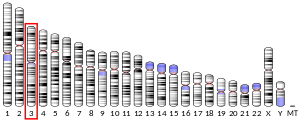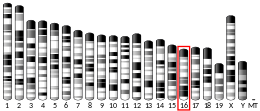EIF4A2
Eukaryotic initiation factor 4A-II is a protein that in humans is encoded by the EIF4A2 gene.[5][6]
References
- GRCh38: Ensembl release 89: ENSG00000156976 - Ensembl, May 2017
- GRCm38: Ensembl release 89: ENSMUSG00000022884 - Ensembl, May 2017
- "Human PubMed Reference:". National Center for Biotechnology Information, U.S. National Library of Medicine.
- "Mouse PubMed Reference:". National Center for Biotechnology Information, U.S. National Library of Medicine.
- Sudo K, Takahashi E, Nakamura Y (Jan 1996). "Isolation and mapping of the human EIF4A2 gene homologous to the murine protein synthesis initiation factor 4A-II gene Eif4a2". Cytogenet Cell Genet. 71 (4): 385–8. doi:10.1159/000134145. PMID 8521730.
- "Entrez Gene: EIF4A2 eukaryotic translation initiation factor 4A, isoform 2".
Further reading
- Maruyama K, Sugano S (1994). "Oligo-capping: a simple method to replace the cap structure of eukaryotic mRNAs with oligoribonucleotides". Gene. 138 (1–2): 171–4. doi:10.1016/0378-1119(94)90802-8. PMID 8125298.
- Suzuki Y, Yoshitomo-Nakagawa K, Maruyama K, et al. (1997). "Construction and characterization of a full length-enriched and a 5'-end-enriched cDNA library". Gene. 200 (1–2): 149–56. doi:10.1016/S0378-1119(97)00411-3. PMID 9373149.
- Li W, Belsham GJ, Proud CG (2001). "Eukaryotic initiation factors 4A (eIF4A) and 4G (eIF4G) mutually interact in a 1:1 ratio in vivo". J. Biol. Chem. 276 (31): 29111–5. doi:10.1074/jbc.C100284200. PMID 11408474.
- Kyono K, Miyashiro M, Taguchi I (2002). "Human eukaryotic initiation factor 4AII associates with hepatitis C virus NS5B protein in vitro". Biochem. Biophys. Res. Commun. 292 (3): 659–66. doi:10.1006/bbrc.2002.6702. PMID 11922617.
- Strausberg RL, Feingold EA, Grouse LH, et al. (2003). "Generation and initial analysis of more than 15,000 full-length human and mouse cDNA sequences". Proc. Natl. Acad. Sci. U.S.A. 99 (26): 16899–903. doi:10.1073/pnas.242603899. PMC 139241. PMID 12477932.
- Gerhard DS, Wagner L, Feingold EA, et al. (2004). "The Status, Quality, and Expansion of the NIH Full-Length cDNA Project: The Mammalian Gene Collection (MGC)". Genome Res. 14 (10B): 2121–7. doi:10.1101/gr.2596504. PMC 528928. PMID 15489334.
- Sarkar M, Das S, Bandyopadhaya A, et al. (2005). "Upregulation of human mitochondrial NADH dehydrogenase subunit 5 in intestinal epithelial cells is modulated by Vibrio cholerae pathogenesis". FEBS Lett. 579 (16): 3449–60. doi:10.1016/j.febslet.2005.05.012. PMID 15946665.
- Feng P, Everly DN, Read GS (2005). "mRNA Decay during Herpes Simplex Virus (HSV) Infections: Protein-Protein Interactions Involving the HSV Virion Host Shutoff Protein and Translation Factors eIF4H and eIF4A". J. Virol. 79 (15): 9651–64. doi:10.1128/JVI.79.15.9651-9664.2005. PMC 1181552. PMID 16014927.
- Cheyssac C, Dina C, Leprêtre F, et al. (2006). "EIF4A2 is a positional candidate gene at the 3q27 locus linked to type 2 diabetes in French families". Diabetes. 55 (4): 1171–6. doi:10.2337/diabetes.55.04.06.db05-1298. PMID 16567544.
- Ewing RM, Chu P, Elisma F, et al. (2007). "Large-scale mapping of human protein–protein interactions by mass spectrometry". Mol. Syst. Biol. 3 (1): 89. doi:10.1038/msb4100134. PMC 1847948. PMID 17353931.
External links
- Overview of all the structural information available in the PDB for UniProt: Q14240 (Human Eukaryotic initiation factor 4A-II (EIF4A2)) at the PDBe-KB.
This article is issued from Wikipedia. The text is licensed under Creative Commons - Attribution - Sharealike. Additional terms may apply for the media files.




